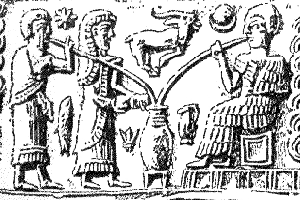

By WILLIAM K. STEVENS
THE NEW YORK TIMES
 Why,
10,000 years or so ago, did people first settle down and go to all the
trouble of sowing, cultivating and reaping crops? Beer, argues a University
of Pennsylvania anthropologist. Why,
10,000 years or so ago, did people first settle down and go to all the
trouble of sowing, cultivating and reaping crops? Beer, argues a University
of Pennsylvania anthropologist.
The event that "primed the pump," according to this new hypothesis, was the accidental discovery by prehistoric humans that wild wheat and barley soaked in water to make gruel, if left out in the open air, did not spoil. Instead, natural yeast in the air converted it into a dark, bubbling brew that made whoever drank it feel good. On top of that, the brew made people robust; at the time it was second only to animal protein as a nutritional source. This combination of mood-altering and nutritional properties would have been incentive enough to cause Neolithic hunter-gatherers in the Near East to begin cultivating the grains, Solomon H. Katz contends in Expeditions, a U-Penn journal. "My argument," Katz said, "is that the initial discovery of a stable way to produce alcohol provided enormous motivation for continuing to go out and collect these seeds."
Strong motivation would have been required to break away from the hunting-gathering way of life, according to one view among archeologists, because - contrary to myth - hunting and gathering provided a higher and more reliable standard of living, with less work, than the onerous and often chancy pursuit of agriculture.
The archeological record so far provides no direct evidence that beer-making prompted the cultivation of grain, Katz said.
Moreover, he said, narrow-necked storage vessels of the kind needed to promote carbonation have been found dating back to the beginnings of Neolithic times. "This vessel is so common through the world that it's incredible," he said. The world's oldest recipe, written on Sumerian tablets, is for beer. Another tablet contains a hymn to the beer goddess, Ninkasi. Long straws for drinking beer - aristocrats of Ur used golden ones - were apparently common in the early Mesopotamian city-states. |